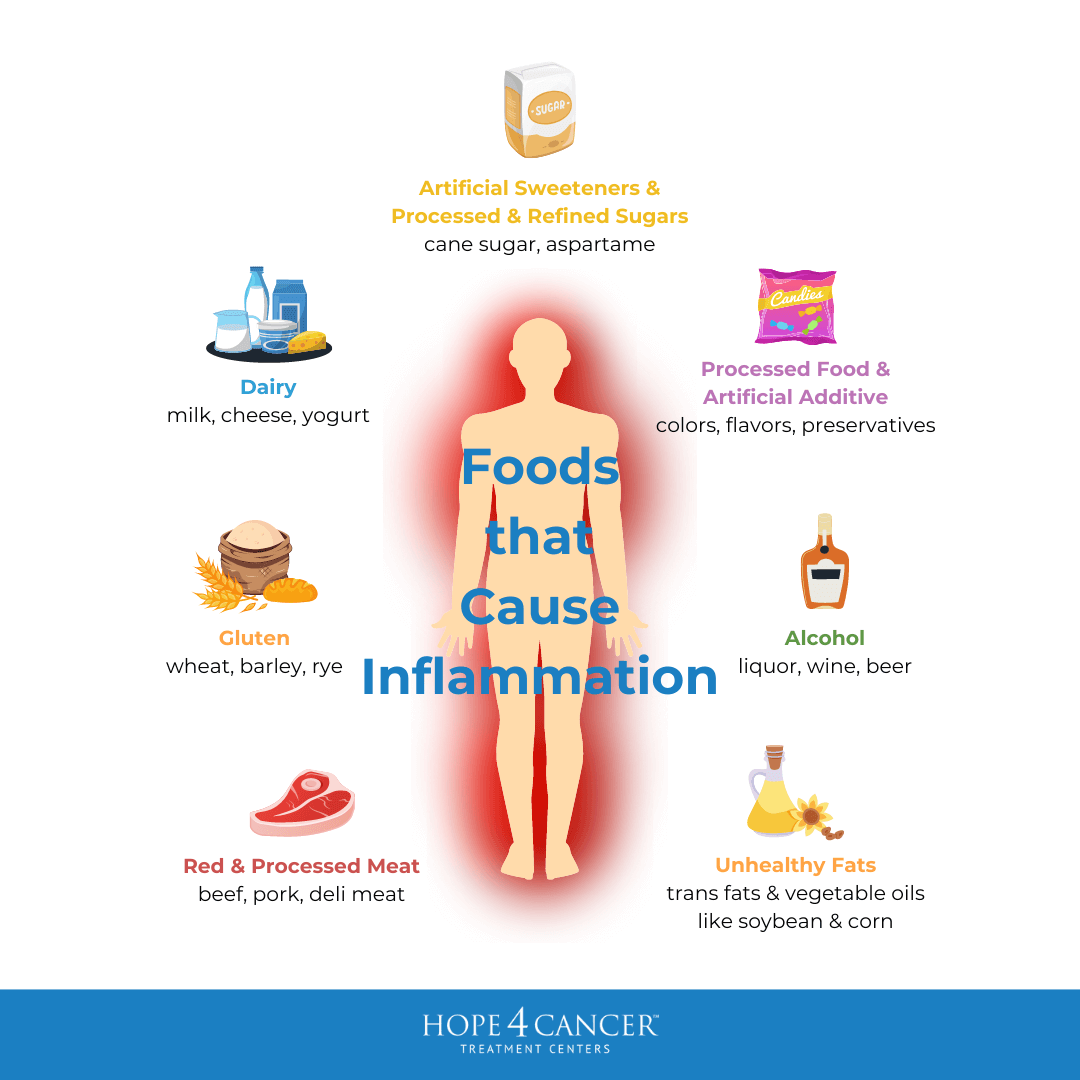Inflammation is the body’s natural response to injury or infection. It is a protective mechanism intended to remove harmful stimuli and initiate the healing process. When it is acute, such as the redness and swelling after a cut or sprain, it is beneficial—signaling the immune system to repair tissue and fight off invaders. However, chronic inflammation, which can persist unnoticed for years, is detrimental. It can arise from prolonged exposure to irritants, such as inflammatory foods or environmental toxins, and it is associated with an increased risk of cancer and other chronic diseases.
Why Are Inflammatory Foods Dangerous?
Inflammatory foods are exactly what they sound like—foods that trigger or exacerbate inflammation within the gut and body. The Standard American Diet (aptly abbreviated as SAD) is full of inflammatory foods. For one, the damage from these foods tends to be asymptomatic, robbing us of the crucial warning signs that typically signal something is amiss and needs correction. This lack of symptoms means that the opportunity for early intervention and dietary adjustments is often missed, allowing the inflammation to progress unchecked.
Additionally, many of these foods have an addictive quality, making them hard to resist despite their harmful effects. Take ice cream, for example; it is not just a treat for the taste buds but it also triggers a significant release of dopamine in the brain, similar to what is observed with addictive substances. This neurological response can create a strong, sometimes uncontrollable, craving for more, further exacerbating the cycle of inflammation and its silent but damaging impact on the body.
Inflammatory foods inflict both direct and systemic damage on the body. Beyond inciting inflammation, they disrupt the delicate balance of the gut microbiome and induce oxidative stress, a harmful process where excessive free radicals overwhelm the body’s ability to neutralize them, leading to cell damage (1). These foods also inflame enterocytes, the cells lining the gut, and degrade the mucin layer, a protective barrier that prevents harmful substances from penetrating the gut wall (2). In turn, this degradation contributes to a condition known as leaky gut, where the intestinal walls become more permeable than normal, allowing toxins and bacteria to seep into the bloodstream (1).
As a result of these combined effects, inflammatory foods are closely linked to a range of cancers including colorectal, pancreatic, gastric, esophageal, and breast cancer (3). Moreover, these foods are also associated with nearly every chronic disease, from heart disease and diabetes to autoimmune disorders and neurological conditions. The inflammatory response elicited by these foods can be a key contributing factor in the development and progression of a wide array of chronic illnesses. The widespread negative impact of these foods on various body systems underscores the importance of avoiding inflammatory foods and embracing a diet rich in anti-inflammatory ingredients.
At Hope4Cancer, educating patients on the benefits of a non-inflammatory diet is central to our treatment protocols. In fact, all the 11 Integrative Hallmarks of CancerTM are intricately connected to a chronic inflammatory response, which suggests that a holistic approach is necessary to overcoming the condition and living a healthy life.
The 7 Categories of Inflammatory Foods
1. Gluten
Gluten, a protein found in wheat, barley, and rye, has been increasingly recognized for its role in promoting inflammation. Gluten contains large molecules called peptides that are resistant to digestion and instead linger and accumulate in the gut. These molecules then activate the immune system, alter the gut microbiome, and contribute to leaky gut syndrome (4). Additionally, gluten can stimulate the release of zonulin, a protein that keeps the cells of the intestine tightly bound together. When zonulin levels increase, these bonds can loosen, further contributing to leaky gut (5). These negative side effects are especially true for people with celiac disease or non-celiac gluten sensitivity (NCGS), two conditions that have surged in the last 50 years. In these cases, the gut damage often involves chronic inflammation and impaired nutrient absorption, which can heighten the risk of developing various forms of cancer.
2. Dairy
Dairy products contain elements that can trigger inflammation. For example, dairy consumption can increase levels of IGF-1 (Insulin-like Growth Factor 1), a natural growth factor that supports the growth of young mammals. Since this hormone can promote cell division and growth, elevated levels of IGF-1 have been linked to increased risks of certain cancers in humans (6). Additionally, many dairy products contain a protein known as A1 beta-casein, which can induce inflammation and irritate the gut lining (7). In non-organic dairy products, the presence of hormones and antibiotics contribute to gut microbiome imbalances that further exacerbate inflammation. As with gluten, these inflammatory responses to dairy are heightened in individuals with specific sensitivities or allergies, such as lactose intolerance.
3. Processed Foods & Artificial Additives (Colors, Flavors, Preservatives)
When processed foods were first introduced in the mid-20th century, it was not immediately apparent how bad they were for our health. We now know that they are a huge contributor to obesity, heart disease, and diabetes, not to mention their direct link with diseases like cancer! With every 10% increase in processed food consumption, there is a 12% higher risk of developing cancer (8).
First, processed foods are directly linked to obesity, and it is well-established that fat releases inflammatory cytokines that contribute to a state of chronic, low-grade inflammation throughout the body (9). Second, these foods have tons of added ingredients and chemicals to increase shelf life and alter the color, texture, and flavor of foods. Over 5,000 ingredients are allowed to be added to foods, some of which are completely unknown to the FDA, and less than half of which have been tested on humans in a proper or rigorous way. An example includes artificial colors like Red 40, which has been directly associated with inflammatory responses (10). Third, because processed food is so low in nutrients and so full of additives, study after study shows how it disrupts the microbiome and contributes to inflammation (11). These points are just a few of the many reasons that illustrate why processed foods are detrimental to our health.
4. Artificial Sweeteners & Processed & Refined Sugars
Added sugars play a significant role in promoting inflammation within the body. When consumed in excess, these sugars, particularly high-fructose corn syrup and other refined sweeteners, can increase the production of pro-inflammatory cytokines. This spike in inflammatory factors is partly due to the rapid rise and fall in blood glucose levels, which triggers a stress response that negatively impacts the immune system and releases these biochemicals (12). In an effort to reduce sugar intake, individuals often resort to artificial sweeteners and sugar substitutes. However, despite their calorie-saving appeal, these alternatives are not a healthy substitute. Studies have shown that some artificial sweeteners like aspartame and stevia can negatively disrupt the gut microbiome. This, in turn, can trigger an immune response, resulting in increased production of inflammatory cytokines (13). Furthermore, certain artificial sweeteners have been associated with changes in glucose tolerance and insulin sensitivity, indirectly promoting inflammatory processes and potentially contributing to the development of metabolic syndrome (13).
5. Red and Processed Meat
Red and processed meats are known contributors to inflammation due to their high content of certain compounds that can trigger inflammatory responses in the body. These meats are rich in saturated fats, which have been associated with increased levels of inflammatory markers like C-reactive protein (CRP) (14). Additionally, processed meats contain high levels of advanced glycation end products (AGEs) and other pro-inflammatory compounds formed while being cooked at high temperatures (15). Another concern is the presence of heme iron in red meat, which, in excess, can catalyze the production of reactive oxygen species (ROS), leading to oxidative stress and inflammation (16). Furthermore, processed meats often have added preservatives, such as nitrates and nitrites, which can convert into nitrosamines in the body, compounds known for their inflammatory and carcinogenic properties.
6. Unhealthy Fats
Fats play a multifaceted role in promoting inflammation. The modern diet, characterized by the proliferation of fast and processed foods, has introduced an excess of unhealthy fats into our daily diet. This issue is compounded by the calorie density of fats, as they contain significantly more calories per gram compared to carbohydrates and proteins. Coupled with larger portion sizes, this calorie surplus contributes directly to obesity and weight gain, two conditions directly linked to chronic inflammation. Diets that are high in unhealthy fats can contribute to complications such as insulin resistance and metabolic dysfunction, that can manifest in conditions like non-alcoholic fatty liver disease (NAFLD), amplifying inflammation and toxicities within the body. Even low-fat products, often perceived as healthier options, can be misleading. They tend to compensate for reduced fat content with higher levels of added sugars to enhance flavor, resulting in elevated calorie intake. Excess sugars also get metabolized and stored in the body as fats through a process called lipogenesis, which does not help the cause.
The true issue lies in the quality (as well as quantity) of fats and foods consumed. Consuming healthy fats are critical to our health and well-being, but we should be cognizant of our fat intake, avoiding processed and deep-fried foods, particularly those containing trans fats. These artificial fats have been linked to a dysregulated increase in the ratio of LDL and HDL cholesterol, ultimately fostering inflammation within blood vessels (17). Trans fats are found in foods we should be avoiding anyway, such as red meat, commercially baked goods like cakes and cookies, and fried foods like doughnuts and chicken.
7. Alcohol
Alcohol consumption, especially when excessive, is a known factor in promoting inflammation within the body. When alcohol is metabolized, it produces acetaldehyde, a toxic compound that can cause significant damage to cells and tissues, leading to an inflammatory response (20). Chronic alcohol consumption can disrupt the balance of the gut microbiome, leading to increased intestinal permeability and leaky gut syndrome (18). Additionally, excessive alcohol intake can impair the liver’s function, a vital organ for detoxification and immune response regulation. This impairment can exacerbate the body’s inflammatory state, contributing to the development of liver diseases like alcoholic hepatitis and cirrhosis, both of which are characterized by pronounced inflammation (19). Moreover, alcohol’s impact on the immune system can compromise its ability to function properly, leading to a heightened state of inflammation.
In Summary
While this article sheds light on the inflammatory foods we should be mindful of, it is equally important to recognize the abundant choices we have in anti-inflammatory foods. These include a diverse range of vegetables, fruits, herbs, spices, fish, healthy oils, seeds and nuts, and beverages. Anti-inflammatory foods are packed with various beneficial compounds like carotenoids, glucosinolates, polyphenols, flavonoids, and essential fatty acids. These foods not only add vibrant flavors and textures to our diets, but also offer powerful anti-inflammatory benefits. By incorporating these ingredients into our daily meals, we can actively support our body’s health and keep chronic diseases like cancer at bay. Stay tuned for a future blog article where we will dive deeper into each of these categories, exploring the myriad of delicious and health-boosting options available to us. Remember, the key to a healthy diet is variety and balance. With so many anti-inflammatory foods to choose from, maintaining a wholesome and enjoyable diet is both achievable and delicious!
References:
- Li L, Peng P, Ding N, Jia W, Huang C, Tang Y. 2023.Oxidative Stress, Inflammation, Gut Dysbiosis: What Can Polyphenols Do in Inflammatory Bowel Disease?Antioxidants (Basel) 12
- Grondin JA, Kwon YH, Far PM, Haq S, Khan WI. 2020.Mucins in Intestinal Mucosal Defense and Inflammation: Learning From Clinical and Experimental Studies.Front Immunol 11:2054
- Sheflin AM, Whitney AK, Weir TL. 2014.Cancer-promoting effects of microbial dysbiosis.Curr Oncol Rep 16:406
- Hansen LBS, Roager HM, Sondertoft NB, Gobel RJ, Kristensen M, et al. 2018. A low-gluten diet induces changes in the intestinal microbiome of healthy Danish adults.Nat Commun9:4630
- Fasano A. 2020.All disease begins in the (leaky) gut: role of zonulin-mediated gut permeability in the pathogenesis of some chronic inflammatory diseases.F1000Res 9
- Romo Ventura E, Konigorski S, Rohrmann S, Schneider H, Stalla GK, et al. 2020.Association of dietary intake of milk and dairy products with blood concentrations of insulin-like growth factor 1 (IGF-1) in Bavarian adults.Eur J Nutr 59:1413-20
- Aslam H, Marx W, Rocks T, Loughman A, Chandrasekaran V, et al. 2020.The effects of dairy and dairy derivatives on the gut microbiota: a systematic literature review.Gut Microbes 12:1799533
- Fiolet T, Srour B, Sellem L, Kesse-Guyot E, Alles B, et al. 2018.Consumption of ultra-processed foods and cancer risk: results from NutriNet-Sante prospective cohort.BMJ 360:k322
- Himbert C, Delphan M, Scherer D, Bowers LW, Hursting S, Ulrich CM. 2017.Signals from the Adipose Microenvironment and the Obesity-Cancer Link-A Systematic Review.Cancer Prev Res (Phila) 10:494-506
- Zhang Q, Chumanevich AA, Nguyen I, Chumanevich AA, Sartawi N, et al. 2023.The synthetic food dye, Red 40, causes DNA damage, causes colonic inflammation, and impacts the microbiome in mice.Toxicol Rep 11:221-32
- Shi Z. 2019.Gut Microbiota: An Important Link between Western Diet and Chronic Diseases. Nutrients 11
- Collier B, Dossett LA, May AK, Diaz JJ. 2008.Glucose control and the inflammatory response.Nutr Clin Pract 23:3-15
- Suez J, Cohen Y, Valdes-Mas R, Mor U, Dori-Bachash M, et al. 2022.Personalized microbiome-driven effects of non-nutritive sweeteners on human glucose tolerance.Cell 185:3307-28 e19
- Fritsche KL. 2015.The science of fatty acids and inflammation.Adv Nutr 6:293S-301S
- Clarke RE, Dordevic AL, Tan SM, Ryan L, Coughlan MT. 2016.Dietary Advanced Glycation End Products and Risk Factors for Chronic Disease: A Systematic Review of Randomised Controlled Trials.Nutrients 8:125
- Gamage SMK, Dissabandara L, Lam AK, Gopalan V. 2018.The role of heme iron molecules derived from red and processed meat in the pathogenesis of colorectal carcinoma.Crit Rev Oncol Hematol 126:121-8
- Oteng AB, Kersten S. 2020.Mechanisms of Action of trans Fatty Acids. Adv Nutr 11:697-708
- Caslin B, Mohler K, Thiagarajan S, Melamed E. 2021.Alcohol as friend or foe in autoimmune diseases: a role for gut microbiome?Gut Microbes 13:1916278
- Osna NA, Donohue TM, Jr., Kharbanda KK. 2017.Alcoholic Liver Disease: Pathogenesis and Current Management.Alcohol Res 38:147-61



